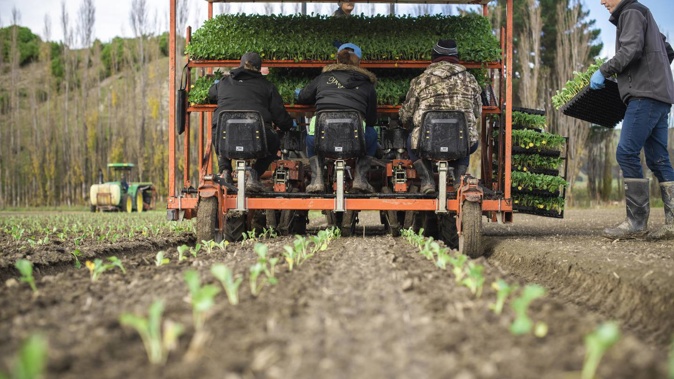
This will be one of the worst years for growers in Aotearoa despite rising prices at the supermarket, says an industry chief executive.
Stats NZ’s food price index showed fruit and vegetable prices rose 23 per cent in the past year.
Food prices were up 12 per cent on last year with fruit and vegetables being the second highest driver of price increases. Within this group, the items having the greatest impact were broccoli, tomatoes, and lettuce, StatsNZ said.
Leaderbrands chief executive Richard Burke said fresh produce prices are unlikely to go down at the supermarket as severe weather across the North Island means growers’ supply has been hard hit.
“We’re not here to make excuses, but we’re certainly battling hard to try and get back to a level of supply that’s more balanced so people can actually get some better values,” Burke said.
“We’re really hoping that people will see us when we’re able to achieve that.”
Burke said conditions are unprecedented for growers across the country: “People think when there are high prices, growers are making a lot of money. But frankly, this will be one of the worst years we’re facing, no question.”
“We’re certainly not making more money under these high prices,” Burke said.
/cloudfront-ap-southeast-2.images.arcpublishing.com/nzme/QWM7DXGSQ5EGZMXC7OPY2QB6OI.jpg)
Leaderbrand chief executive Richard Burke. Photo/ Supplied
- Food prices rise most since 1989 - up 12 per cent for the year
- Annual food prices rise highest in 13 years
- Cyclone Gabrielle: Fresh produce prices likely to rise, experts say
“I think a lot of growers will be in the same boat. I would think growers are feeling rather tired and have worked pretty hard, but it’s not falling to their bottom line.”
Tomatoes and potatoes prices saw the biggest price hike, increasing 117 per cent and 48 per cent.
ASB senior economist Mark Smith said there appeared to be “a tangible impact of North Island storms on retail food prices, and we anticipate further upside in the coming months.
“We expect quarterly rises in food prices to push above 4 per cent, contributing at least 0.7 percentage points to quarterly CPI readings in the first half of this year.”
Food prices rose 2.1 per cent last month compared to January with fruit and vegetables prices up 6 per cent on the previous month.
Burke said less produce for growers means less fresh produce on the market, driving up fresh fruit and vegetable prices.
“Our big issue is around supply. If we can get the volume in, then that’ll have a bigger impact on price than anything else,” Burke said.
He said growers’ plans have been set back.
“Yields are down, paddocks are being lost or [growers are] just unable to plant because of weather.”
Leaderbrands’ Gisborne farm still doesn’t have running water due to pipeline damage in the area. Burke said water supply should be back by the end of the week but expects a delay.
“We’re still running tankers so we’re far from normal, but the big thing for us now is really about our winter preparation,” he said.
/cloudfront-ap-southeast-2.images.arcpublishing.com/nzme/VMIKNJ7S2FC2FBYHWU6E4RO4WY.jpg)
Leaderbrands' greenhouse harvest. Photo / Supplied
“We do a lot of planting at this time of year to take us right through winter on broccoli and lettuce and salads, so there’s a big push on the business at the moment to try and get our land ready for that.”
Burke said Leaderbrand’s farms in Pukekohe and Matamata have seen a very wet summer but are starting to have more consistency, while farms in Gisborne are the worst hit.
“Broccoli and lettuce are still quite affected in this region and will be for a little while. When I say a little while, probably for the next four to six weeks,” he said.
Burke expects salad crops to bounce back sooner. He said, “Crops like spinach and mesclun are fast growing so we’re another week or so away from what we planted after the storm.”
He said their farms in the South Island are tracking well with their current focus on broccoli.
With roads still inaccessible across the North Island, produce is also a challenge to get out of the region.
Burke said, “We are keeping our cool stores really empty because the road north is still quite unstable. There were a couple of road closures last week where the team were doing quite a lot of work removing trees and trying to reduce that risk but it is still quite temperamental.”
“The problem is that may well chase us right into winter, and as we start getting wet again in winter, what’s that impact?”
Burke said however that if winter preparation continues as planned, “there’s no reason why we wouldn’t see those values”.
He said, “We really want to thank people for supporting New Zealand growers because without people supporting us, we wouldn’t be here.”
While he hopes Kiwis can continue to support local growers, Burke said consumers are “feeling the pinch of higher interest rates and higher costs across the board as well”.
“We can’t ask them to do something they’re not prepared to do, but we are working hard to try and get that balance.”
This report was produced under the Public Interest Journalism initiative, funded by NZ on Air
Take your Radio, Podcasts and Music with you









